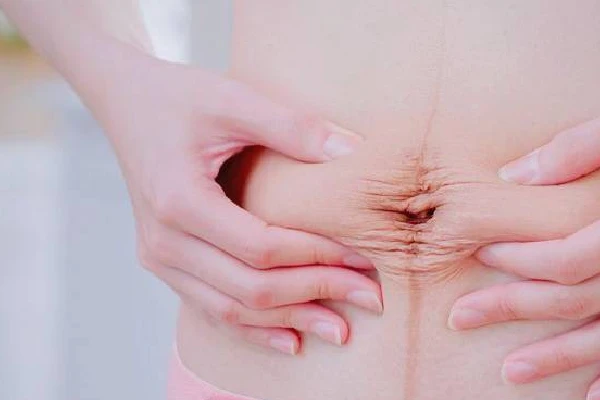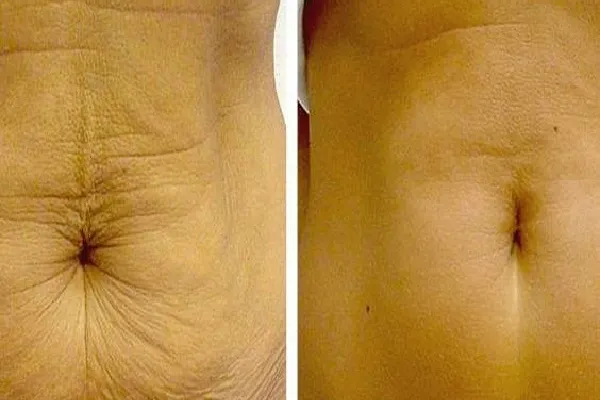Significant weight loss, especially if it occurs quickly, can lead to loose skin. This issue is attributed to fat loss and skin stretching over time. Some individuals may adapt to this change naturally, while others look for ways to tighten their skin and improve their overall appearance.
This article focuses on the causes of loose skin, as well as potential side effects and various treatment options. Additionally, some tips are provided to help to prevent loose skin in the first place.
Causes of loose skin
- Loss of collagen and elastin: Your skin is made up of collagen and elastin proteins, which provide it with strength and elasticity. As you get older, your body naturally produces less collagen and elastin. Further, the production of these proteins significantly reduces by rapid weight loss.
- Fat loss: There is a fat layer under your skin that helps to keep the skin looking smooth and plump. Following weight loss, this layer is lost and your skin becomes loose and sagging.
- Skin damage: Sun exposure, smoking, and certain medical conditions can damage your skin and cause its loose.
Side effects of loose skin
- Loose skin can rub against itself, leading to irritation and discomfort. Furthermore, skin folds can make cleaning more difficult and increase the risk of infection.
- Some individuals are embarrassed by the appearance of loose skin, which can affect their self-esteem, as well as their quality of life.
- Loose skin can restrict your movement during exercise and result in feeling pain and discomfort.

Does the loose skin caused by weight loss go away on its own?
Many individuals experience loose skin after losing weight, especially in areas such as the abdomen, arms, and thighs. However, there is no definite answer as to whether this excess skin will naturally tighten.
Medical experts in this field have introduced several contributors in this regard as follows:
- The possibility of skin tightening on its own is less when there is more skin to contract.
- As you get older, your skin loses its elasticity and has lower tendency to contract after stretching.
- Some individuals naturally have more elastic skin than others do.
- Faster weight loss can lead to more loose skin.
- Healthy and undamaged skin is more likely to tighten on its own.
Doctors believe the likelihood of improving loose skin is more among the patients who:
- have no symptoms of skin traction.
- are young.
- have good skin quality even despite the previous weight gain.
The doctors also emphasize that if you have lost weight slowly and steadily, give your skin about one year to fully contract after reaching your goal weight. They point out that you will not observe a significant contraction after this period.
Related content: What is smart plastic surgery?
Natural treatments
- Resistance training: Muscle building assists in tightening the skin and making it look smoother.
- Collagen consumption: Collagen is a protein that strengthens the skin. Collagen supplements or foods such as bone broth can be useful.
- Essential nutrients: The consumption of protein, vitamin C, omega-3 fatty acids, and enough water is essential for skin health.
- Skin-tightening creams: These creams may temporarily tighten the skin although their effects are not deep.
- Skin hydration: Drinking enough water helps to keep the skin hydrated and maintain its elasticity.
Home remedies
- Cocoa butter: Some believe that cocoa butter can contribute to skin tightening due to its moisturizing properties.
- Aloe vera: Given the anti-inflammatory and moisturizing properties of aloe vera, it may help in improving the appearance of loose skin
- Egg white: Egg white is a source of protein, which can assist in tightening the skin.

Medical treatments
-
Non-invasive treatments:
- Laser therapy: Lasers can stimulate collagen and improve the appearance of your skin.
- Radiofrequency therapy: In this method, radio waves are used to heat the lower layers of the skin and stimulate collagen production.
- Ultrasound therapy: Ultrasound can help to tighten the skin and enhance its elasticity.
-
Surgery:
- Abdominoplasty: This procedure is conducted to remove excess skin from the abdomen and tighten the abdominal muscles.
- Brachioplasty: Brachioplasty entails the excision of the excess skin of arms, as well as tightening them.
- Thigh lift (thighplasty): This approach involves removing the excess skin of thighs and tightening them.
Tips to prevent loose skin:
- Lose weight slowly and steadily: Aim to lose 1-2 pounds a week.
- Follow a healthy diet: Fill your diet with protein, fruits, and vegetables.
- Drink enough water: Drink 8-10 glasses of water every day.
- Exercise regularly: Exercise for at least 30 minutes on most days of the week.
- Protect your skin from the sun: Apply sunscreen with SPF every day.
Choosing the best treatment
The best treatment for the loose skin caused by weight loss is chosen by considering several factors such as the degree of loose skin, as well as age, overall health, and your preferences.
Consultation with a dermatologist or plastic surgeon can help you to choose the best therapeutic option.
Conclusion:
Loose skin is common after weight loss, especially significant weight loss. If this sagging and loose skin bothers you, you can look for solutions to fix this problem.
You may need body contouring surgeries or other medical methods to tighten or remove loose skin. If you are looking to fix the loose skin caused by weight loss, the Tinogroup Healthy Care Agency with specialist and experienced doctors offers excellent skin and beauty services.
Contact us today to schedule your skin tightening consultation and enjoy a tight and beautiful skin with more self-confidence.

